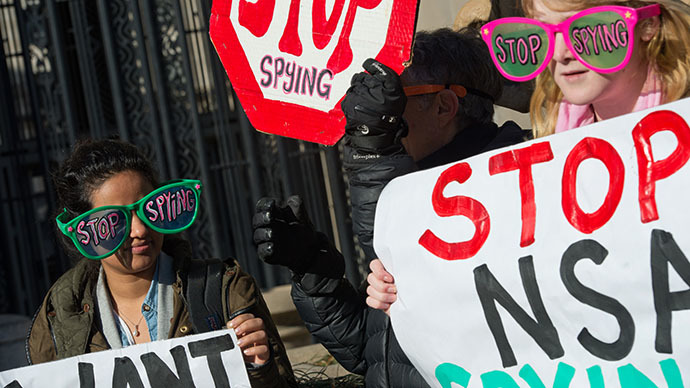‘People using tech against surveillance state, as Snowden predicted’

People are taking online protection into their own hands globally to evade the United States' vast spying regime, as US officials have failed to address broad outrage over US surveillance programs, legal expert Jesselyn Radack told RT.
Radack – director of national security and human rights at the Government Accountability Project, and lawyer to former NSA contractor and whistleblower Edward Snowden – said “individuals are doing exactly what Mr. Snowden predicted” in sticking up for themselves to combat the US government’s surveillance operations.
“Many people I know are now encrypting information and taking other precautions: in the search engines they use, learning how to use encryption, and how to protect themselves (online),” she said. “So I think people are taking care of it.”
Thursday marks the one-year anniversary of the first published Snowden leaks in the Guardian and The Washington Post. In commemoration of the Snowden leaks, and to encourage online-protection practices, internet activists and rights groups have launched a new online campaign against mass government surveillance called ResetTheNet.
RT:Do you think the authorities will eventually be held accountable for spying on their citizens, or do you think this is what all governments do? Where do we stand on that?
Jesselyn Radack: It’s hard to know. The USA Freedom Act in Congress has been watered-down significantly by the House of Representatives. But I’m hopeful that, in the courts, we may see some justice. Now that these cases are finally going through, we have one judge who found the program [bulk collection of domestic telephone metadata] to be “likely unconstitutional.”
In terms of people actually being held accountable, that’s another question. People seem to be resigning, and stepping down, and reshuffling. In terms of accountability of the many atrocities that occurred after 9/11, that simply has not occurred. But in terms of reigning in the surveillance state, I do feel more hopeful about that.
RT:Now a year out from when Edward Snowden made his statements and released this information – is the average individual any safer? Is information about them any safer?
JR: I think average individuals are doing exactly what Mr. Snowden predicted, that if government doesn’t take care of this, technology will. And so many people I know are now encrypting information and taking other precautions: in the search engines they use, learning how to use encryption, and how to protect themselves. So I think people are taking care of it.
People are making changes, and corporations are making changes, too, in their own policies and trying to protect information, trying to publicize national security letters and that kind of thing, more transparency.
RT:Even countries, as well, are considering their own networks now to put a wall between them and Washington. But I guess that undermines the whole concept of the internet as a global, unifying platform. It’s quite sad, isn’t it?
JR: It is. I don’t like to see the Balkanization of the internet. But at the same time, if Europe wants to build its own fiber-optic cable to escape the claws of the US – the fact that if you send an email from Pakistan to Libya, that it all has to go through the United States, I can see why most of the world, after finding out what the US has been doing with that information, why people want to create their own technological infrastructure within their own country so they have their own apparatus.
I don’t think it will necessarily quash the global community the internet has allowed us to create. I certainly hope not. It’s been one of the true beauties of having internet available in this generation today.
RT:Edward Snowden has said more leaks are to come. How much more could come, do you think?
JR: According to Glenn Greenwald – one of the reporters Snowden gave information, and Glenn is on a book tour right now – he said there are a lot more stories and a lot more information to come out.
Snowden himself doesn’t have control over what stories come out on what topic and when and by whom. So it’s really up to the journalists, who have this precious cache of information, to put those stories out that they believe to be in the public interest.
The statements, views and opinions expressed in this column are solely those of the author and do not necessarily represent those of RT.












